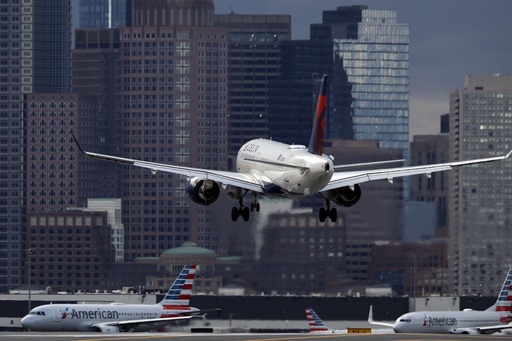Delta Air Lines eked out a narrow first-quarter profit and said Wednesday that demand for travel is strong heading into the summer vacation season, with travelers seemingly unfazed by recent incidents in the industry that ranged from a panel blowing off a jetliner in flight to a tire falling off another plane during takeoff.
Delta reported the highest revenue for any first quarter in its history and a $37 million profit. It expects record-breaking revenue in the current quarter as well. The airline said that second-quarter earnings will likely beat Wall Street expectations.
CEO Ed Bastian said Delta’s best 11 days ever for ticket sales occurred during the early weeks of 2024.
If travelers are worried about a spate of problem flights and increased scrutiny of plane maker Boeing, “I haven’t seen it,” Bastian said in an interview. “I only look at my numbers. Demand is the healthiest I’ve ever seen.”
A slight majority of Delta’s fleet of more than 950 planes are Boeing models, but in recent years it has bought primarily from Airbus, including a January order for 20 big Airbus A350s. As a result, Delta will avoid the dilemma facing rivals United Airlines and American Airlines, which can’t get all the Boeing planes they ordered. United is even asking pilots to take unpaid time off in May because of a plane shortage.
“Airbus has been consistent throughout these last five years (at) meeting their delivery targets,” Bastian said.
Delta does not operate any Boeing 737 Max jets, the plane that was grounded worldwide after two fatal crashes in 2018 and 2019, and which suffered the panel blowout on an Alaska Airlines flight this year. However, the Atlanta-based airline has ordered a new, larger version of the Max that still hasn’t been approved by regulators. Bastian said Delta will be happy to use the Max 10 when they arrive.
While Delta has largely dodged headaches caused by Boeing, it faces other obstacles in handling this summer’s crowds.
Delta is lobbying the federal government to again allow it to operate fewer flights into the New York City area. Otherwise, Delta could lose valuable takeoff and landing slots.
The Federal Aviation Administration granted a similar request last summer and even extended it until late October. The FAA said the relief helped airlines reduce canceled flights at the region’s busy three main airports by 40%.
Peter Carter, an executive vice president who oversees government affairs, said Delta and other airlines need another waiver permitting fewer flights this summer because the FAA still doesn’t have enough air traffic controllers.
“Absent the waiver, I think we would have, as an industry, some real challenges in New York,” Carter said.
Airlines for America, a trade group of the major U.S. carriers, is also pushing for a waiver from rules on minimum flights in New York. The FAA said it would review the request.
Delta customers will see another change — a new system for boarding planes. Instead of boarding by groups with names such as Diamond Medallions, Delta Premium Select and Sky Priority, passengers will board in groups numbered one through eight. The airline says it will be less confusing.
“When you have a number and you’re standing in line, we are all trained to know when it’s our turn,” Bastian said.
The change won’t alter the pecking order of when each type of customer gets to board. Those with the cheapest tickets, Basic Economy, will still board last.
Delta’s first-quarter profit follows a $363 million loss a year ago, when the results were weighed down by spending on a new labor contract with pilots.
“We expect Delta to be one of the few airlines to report a profit in the March quarter,” TD Cowen analyst Helane Becker said even before Delta’s results were released.
Delta said that excluding special items, it earned 45 cents per share. Analysts were expecting 36 cents per share, according to a FactSet survey.
The airline forecast second-quarter earnings of $2.20 to $2.50 per share. The Wall Street consensus was $2.22 per share. The company stood by its forecast of full-year earnings between $6 and $7 per share.
First-quarter revenue rose 8%, to $13.75 billion. Putting Delta’s Pennsylvania refinery aside, operating revenue was slightly more than analysts predicted. The airline said second-quarter revenue will be 5% to 7% higher than a year ago.
The airline reported that large corporate customers — who were slower than leisure travelers to resume flying after the coronavirus pandemic — are spending more on travel, including firms in technology and financial services.
Delta has boosted profit by focusing more on premium passengers who pay the highest fares, and raking in money from a credit-card partnership with American Express.
Costs could rise too, however. Jet fuel is higher than it was a year ago, following a run-up in oil prices, and Delta is spending more on aircraft maintenance this year.
Shares of Delta Air Lines Inc. fell 2.3% by the end of regular trading Wednesday.


